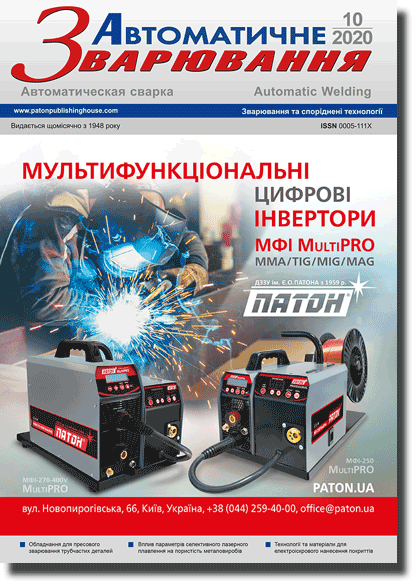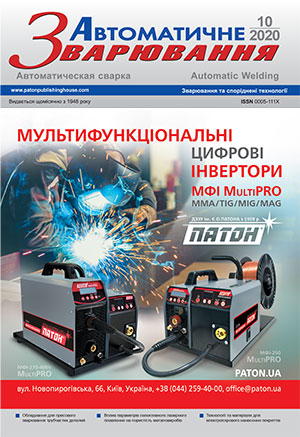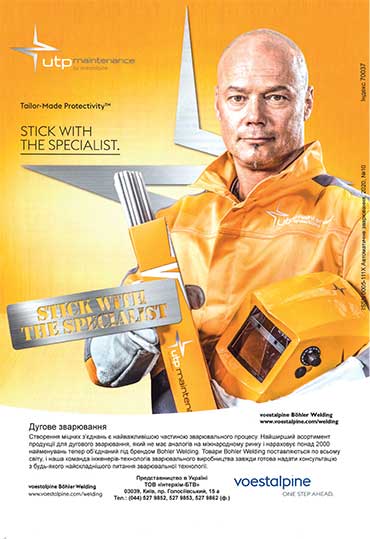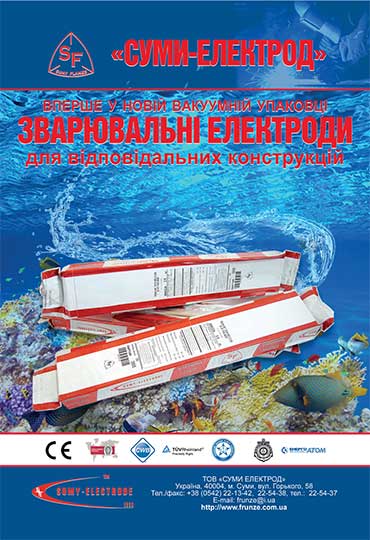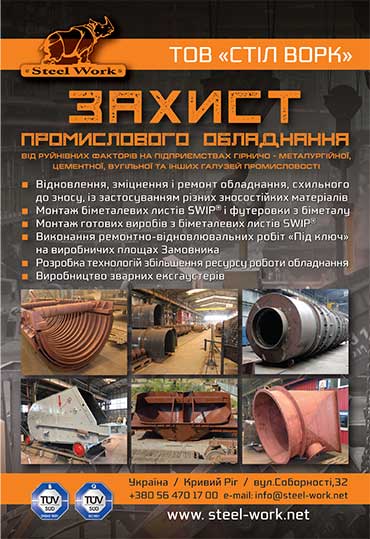| 2020 №10 (06) |
DOI of Article 10.37434/as2020.10.07 |
2020 №10 (08) |
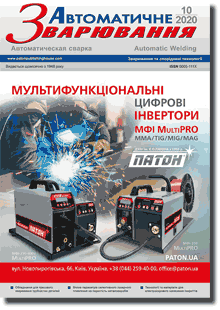
"Avtomatychne Zvaryuvannya" (Automatic Welding), #10, 2020, pp. 38-42
Influence of antimony on structure and mechanical properties of pre-euttectic copper-phosphoric alloys
S. V. Maksymova, A. N. Pisarev, P. V. Kovalchuk, V. V. Voronov
E.O. Paton Electric Welding Institute of the NAS of Ukraine. 11 Kazymyr Malevych Str., 03150, Kyiv, Ukraine. E-mail: office@paton.kiev.ua
The results of investigations of pre-eutectic alloys of the Cu – P – Sb system are presented. The melting temperature interval was determined using high-temperature differential thermal analysis. It was found that antimony alloying of copper-phosphorus pre-eutectic alloy provides a decrease in the temperature of solidus and liquidus. On the basis of experimental and literature data, the surfaces of liquidus and solidus of ternary alloys were constructed. Using micro-X-ray spectral analysis, the chemical composition and a number of structural components of the Cu - 6.29P - 1.97Sb alloy were determined. The influence of antimony on technological and mechanical properties, as well as morphology of cast ternary pre-eutectic copper-phosphorous alloys is shown. 10 Ref., 2 Tabl., 6 Fig.
Keywords: cupper-phosphorous pre-eutectic alloys, antimony, temperature of solidus and liquidus, microstructure, strength
Received: 30.09.2020
References
1. Petrunin, I.E. (2003) Handbook on brazing. Моscow, Маshinostroenie [in Russian].2. Pashkov, I.N., Ilina, I.I., Shapiro, A.E. (2006) Properties and applications of Cu-based silver free brazing filler metals made by rapid solidification technique. In: Proc. of the 3rd Int. Brazing and Soldering Conf. (San Antonio, Texas, USA), 157–166.
3. Pashkov, I., Pashkov, A. (2012) Change in phase morphology and composition during the spreading of liquid alloy, which is actively interacting with base metal surface. In: Proc. of the 5th Int. Brazing and Soldering Conf. (Las Vegas, Nevada, USA), 240–243.
4. Boutilier, J., Brown, N., Klidas, N., Alexandrov, B.T., Shapiro, A.E. (2018) Strength of steel, copper, and brass lap joints brazed by silver-based and silver-free filler metals. In: Proc. of the 7th Int. Brazing and Soldering Conf. (New Orleans, USA), 360–366.
5. Drits, М.Е. (1979) Binary and multicomponent systems based on copper (Reference). Moscow, Nauka [in Russian].
6. Vozdvizhensky, V.N., Grachev, V.A., Spassky, V.V. (1984) Casting alloys and their melting technology in mechanical engineering. Moscow, Маshinostroenie [in Russian].
7. Lyakishev, N.P. (1999) State diagrams of binary metal systems. In: Refer. book: 3 vol.. V.3. Book.1. Moscow, Маshinostroenie [in Russian].
8. Smiryagin, A.P., Smiryagina, N.A., Belova, A.V. (1974) Industrial nonferrous metals and alloys. Moscow. Metallurgiya [in Russian].
9. Suchkov, D.I. (1967) Copper and its alloys. Moscow, Metallurgiya [in Russian].
10. Pisarev, A.N., Doroshenko, L.K., Safronova, E.A. (1992) Copper fusibility angle of the copper-phosphorus-antimony system. In: Physical chemistry and technology of phosphides of phosphorus-containing alloys. In: 2 parts. Pt 2. Alma-Ata «Gylym», 18–22 [in Russian].
Advertising in this issue:
The cost of subscription/purchase order journals or individual articles
| Journal/Currency | Annual Set | 1 issue printed |
1 issue |
one article |
| TPWJ/USD | 384 $ | 32 $ | 26 $ | 13 $ |
| TPWJ/EUR | 348 € | 29 € | 24 € | 12 € |
| TPWJ/UAH | 7200 UAH | 600 UAH | 600 UAH | 280 UAH |
| AS/UAH | 1800 UAH | 300 UAH | 300 UAH | 150 UAH |
| AS/USD | 192 $ | 32 $ | 26 $ | 13 $ |
| AS/EUR | 180 € | 30 € | 25 € | 12 € |
| SEM/UAH | 1200 UAH | 300 UAH | 300 UAH | 150 UAH |
| SEM/USD | 128 $ | 32 $ | 26 $ | 13 $ |
| SEM/EUR | 120 € | 30 € | 25 € | 12 € |
| TDNK/UAH | 1200 UAH | 300 UAH | 300 UAH | 150 UAH |
| TDNK/USD | 128 $ | 32 $ | 26 $ | 13 $ |
| TDNK/EUR | 120 € | 30 € | 25 € | 15 € |
AS = «Automatic Welding» - 6 issues per year;
TPWJ = «PATON WELDING JOURNAL» - 12 issues per year;
SEM = «Electrometallurgy Today» - 4 issues per year;
TDNK = «Technical Diagnostics and Non-Destructive Testing» - 4 issues per year.




